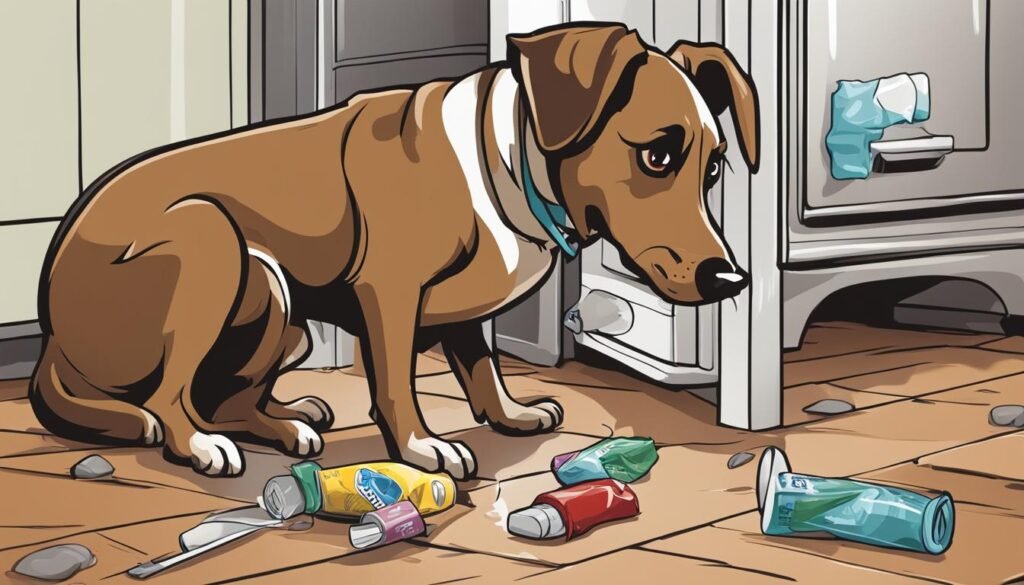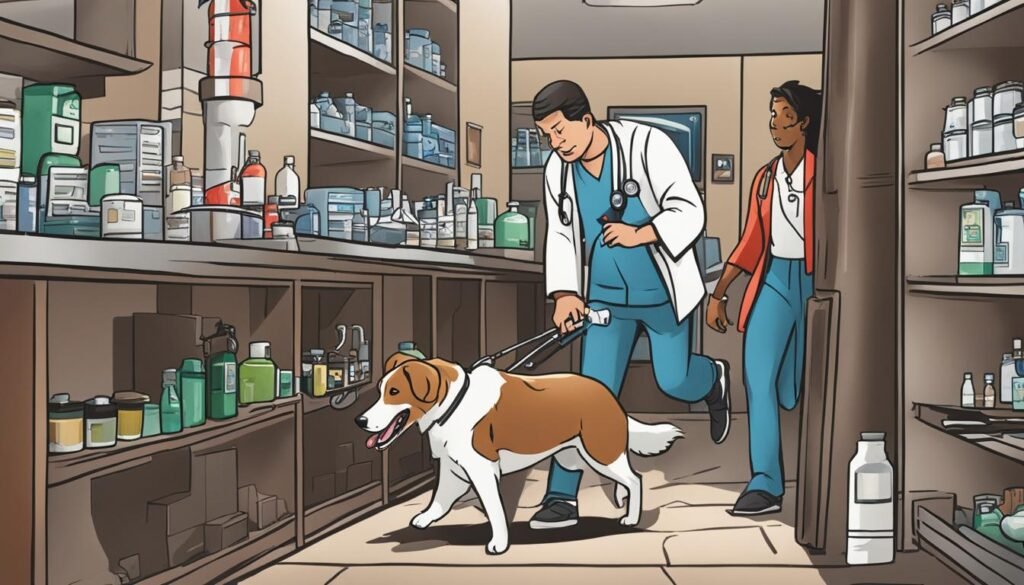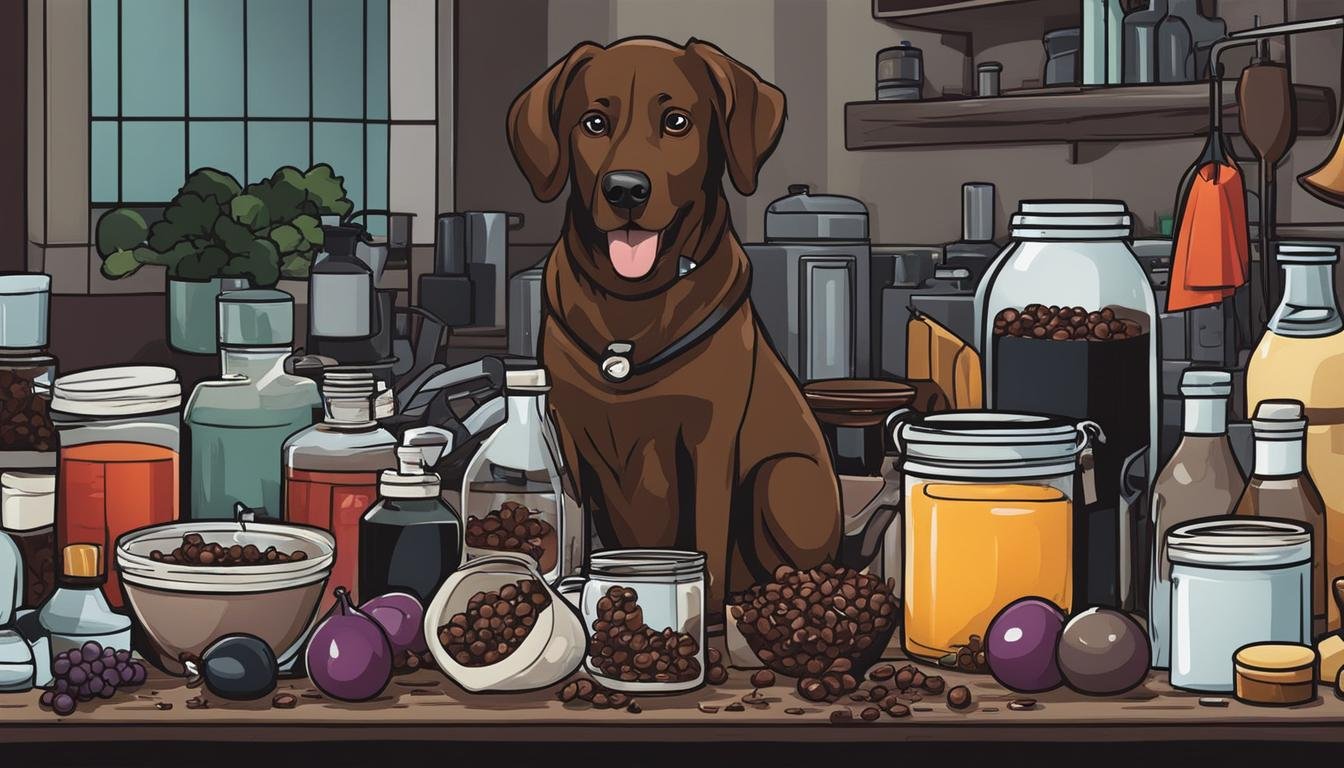As dog owners, it’s our responsibility to keep our furry friends safe from harm. While we often focus on external dangers like traffic or unfamiliar dogs, it’s important not to overlook the potential hazards lurking within our own homes. There are several household items that can be toxic and even fatal to dogs if ingested. Knowing what these items are can help us take the necessary precautions to protect our beloved pets.
In this article, we will explore the dangerous household items that can pose a threat to our dogs. From common chemicals to everyday foods, being aware of these toxins is crucial for their wellbeing. Let’s dive in and discover what household items can kill a dog instantly.
Key Takeaways:
- Several chemicals found in rat poisons and mosquito repellents can be deadly for dogs.
- Household items like alcoholic beverages, chocolate, and nuts can cause severe symptoms and even death.
- It is essential to pet-proof your home and be aware of potential hazards to prevent accidental poisoning.
- If you suspect your dog has ingested a toxic item, contact your veterinarian immediately.
- Stay informed about pet poison control resources and consider enrolling in a pet first aid and CPR course.
Protecting Your Dog from Common Household Dangers
As a responsible dog owner, it is crucial to be aware of the household dangers that could harm your furry friend. By taking the necessary precautions, you can ensure a safe and pet-friendly environment for your dog. Here are some key tips:
Pet-Proof Your Home
One of the first steps in protecting your dog is to pet-proof your home. Keep potentially hazardous items, such as cleaning products, medications, and chemicals, stored securely out of your dog’s reach. Remember that dogs are curious creatures and may explore cabinets and shelves in search of new and interesting items to investigate.
It is also essential to secure trash cans with pet-proof lids to prevent your dog from digging into them and potentially consuming harmful substances. Additionally, be aware of any plants that are toxic to dogs and ensure they are kept in areas that are inaccessible to your pet.
Be Mindful of Food and Treats
Many common household foods can be toxic to dogs. Avoid feeding your dog chocolate, caffeine, grapes, raisins, nuts, and foods high in salt. It’s also essential to be cautious with leftovers and household scraps, as some ingredients like onions, garlic, and artificial sweeteners can be harmful to dogs.
When choosing treats and dental products for your dog, make sure to check the ingredient list and avoid those that contain xylitol or other harmful substances. Stick to pet-specific treats and consult with your veterinarian for recommendations.
Create a Safe Outdoor Space
If you have a backyard or outdoor space where your dog spends time, ensure it is properly fenced and secure. This will prevent your dog from wandering off and encountering potential dangers such as poisonous plants or neighboring animals that may pose a threat.
Regularly inspect your yard for any potential hazards, such as sharp objects, toxic substances, or gaps in the fencing that your dog could escape through. Providing your dog with a safe and supervised outdoor environment is essential for their overall well-being.
| Hazard | Precautions |
|---|---|
| Cleaning Products | Store securely out of reach and use pet-friendly alternatives whenever possible. |
| Medications | Keep all medications in a closed cabinet or drawer, away from your dog’s access. |
| Chemicals | Store household chemicals, such as detergents and pesticides, in a safe and locked area. |
| Trash Cans | Use pet-proof lids and make sure to dispose of any potentially harmful items properly. |
| Plants | Research which plants are toxic to dogs and keep them out of their reach. |
By following these precautions, you can create a safe and dog-friendly environment in your home. Remember to always be vigilant and attentive to your dog’s well-being, as prevention is key in protecting them from common household dangers.

What to Do If Your Dog Is Poisoned
If you suspect that your dog has ingested a toxic substance, it is crucial to act quickly to ensure their safety. Here are the steps you should take if your dog is poisoned:
Step 1: Contact Your Veterinarian
The first thing you should do is call your veterinarian or a local emergency veterinary clinic. They will be able to provide you with immediate guidance on how to proceed. It is helpful to provide them with as much information as possible, including the name of the toxic substance, if known. Keep any packaging or samples of the substance for identification purposes.
Step 2: Watch for Symptoms
While waiting for professional help, closely monitor your dog for any symptoms of poisoning. Common signs include vomiting, diarrhea, tremors, seizures, abnormal behavior, or difficulty breathing. Document any changes in their condition to share with your veterinarian.
Step 3: Follow Veterinary Instructions
Follow your veterinarian’s instructions carefully. They may recommend inducing vomiting, but never attempt to do so without professional guidance. Avoid administering any home remedies without consulting your veterinarian first. They will provide you with specific instructions tailored to your dog’s situation.
Step 4: Seek Veterinary Care
If your veterinarian advises it, take your dog to a veterinary emergency hospital as soon as possible. They will have the necessary resources and expertise to provide immediate treatment. Time is of the essence when dealing with a potential poisoning, so do not delay in seeking professional help.
| Symptoms of Dog Poisoning | Steps to Take |
|---|---|
| Vomiting, diarrhea, tremors, seizures, abnormal behavior, difficulty breathing | Contact your veterinarian immediately |
| Provide information about the substance ingested | Keep packaging or samples for identification |
| Follow veterinary instructions | Do not induce vomiting or administer home remedies without professional guidance |
| Seek veterinary care | If advised, take your dog to a veterinary emergency hospital |
Remember, prevention is always better than cure. Take precautions to pet-proof your home and keep potentially toxic substances out of your dog’s reach. By being aware of household dangers and acting swiftly in case of an emergency, you can help ensure the well-being of your furry friend.

Additional Resources and Education
As a responsible dog owner, it’s crucial to stay informed about the potential household dangers that can harm your furry friend. Fortunately, there are plenty of resources available to help you educate yourself and keep your dog safe.
One valuable resource is the ASPCA Animal Poison Control Center, which offers a podcast and a free mobile app. These tools can help you identify hazards and provide guidance on the necessary steps to take in case of an emergency. Additionally, their website contains a wealth of information on common toxins and poisons that may pose a threat to your dog.
For a more comprehensive understanding of dog safety, consider accessing the websites of reputable sources such as the ASPCA and other veterinary organizations. These organizations provide educational materials and articles on various topics, including pet-proofing your home and identifying potential hazards.
Another excellent way to enhance your knowledge of dog safety is by enrolling in a pet first aid and CPR course. This will equip you with essential skills for handling emergencies and ensure you’re prepared to provide immediate care until veterinary help is available.
FAQ
What household items can kill a dog instantly?
Several chemicals commonly found in rat, mouse, and mole poisons can be deadly for dogs, both through direct ingestion and indirectly through nibbling on a rodent killed by the poison. Mosquito repellents for humans often contain DEET, which is toxic to dogs and can cause tremors, seizures, and even death. Slug bait containing the active ingredient metaldehyde can be fatal to dogs and symptoms may include panting, vomiting, seizures, and tremors. Alcoholic beverages can cause vomiting, diarrhea, decreased coordination, difficulty breathing, and even death in dogs. Raw bread dough containing yeast can make dogs drunk and cause painful gas and bloating. Nicotine products can be poisonous to dogs and can cause symptoms such as severe vomiting, depression, seizures, and even death. Marijuana, including THC and CBD products, can be toxic to dogs and may cause poisoning. Chocolate, coffee, and caffeine contain theobromine and can cause vomiting, diarrhea, hyperactivity, abnormal heart rhythm, seizures, and even death in dogs. Grapes and raisins can cause kidney failure in dogs. Nuts, such as macadamia nuts, almonds, pecans, and walnuts, can cause vomiting, diarrhea, weakness, depression, tremors, and hyperthermia in dogs. Citrus fruits and products containing citric acid can cause stomach upset and central nervous system depression in dogs. Milk and dairy products can cause digestive upset and diarrhea in dogs due to their lack of lactase enzyme. Raw/undercooked meat, eggs, and bones can contain harmful bacteria such as Salmonella and E. coli that can be harmful to both dogs and humans. Excessive consumption of salt and salty snack foods can cause excessive thirst, vomiting, diarrhea, tremors, seizures, and even death in dogs. Xylitol and sorbitol, sweeteners found in various products, can cause low blood sugar, liver failure, and diarrhea in dogs. Certain breath fresheners containing menthol and sweeteners like xylitol can irritate a dog’s mouth and gastrointestinal tract. Petroleum jelly can cause diarrhea and vomiting in dogs if ingested. Bar soap and face wash can cause digestive upset, diarrhea, and gastrointestinal blockage if your dog swallows them.
How can I protect my dog from common household dangers?
Keep rodent poisons out of reach of dogs and consider alternative methods of pest control. Use mosquito repellents specifically designed for dogs, avoiding products containing DEET. Be cautious with slug bait and use pet-safe alternatives to control slugs. Never give your dog alcohol or let them consume any alcoholic beverages. Keep yeast dough and unbaked bread away from your dog’s reach. Store nicotine products securely and avoid exposing your dog to marijuana or THC/CBD products. Store chocolate, coffee, and caffeine-containing products in a place inaccessible to dogs. Keep grapes, raisins, and chocolate-covered foods away from your dog. Avoid feeding your dog nuts and be mindful of any products containing them. Be cautious with citrus fruits and keep them out of your dog’s reach. Limit your dog’s consumption of milk and dairy products. Always cook meat and eggs thoroughly and prevent your dog from accessing bones. Keep salty snacks and foods high in salt away from your dog. Avoid products containing xylitol and sorbitol when choosing treats and dental products for your dog. Be mindful of breath fresheners and avoid giving your dog any products containing menthol or xylitol. Keep petroleum jelly and bar soap out of your dog’s reach.
What should I do if my dog is poisoned?
If you suspect your dog has ingested a toxic household item, contact your veterinarian immediately. Be prepared to provide information about the item ingested, including packaging or samples, to help with accurate identification and treatment. Keep emergency helpline numbers, such as the ASPCA Animal Poison Control Center and Pet Poison Helpline, readily available. Watch for symptoms of poisoning, including vomiting, diarrhea, tremors, seizures, abnormal behavior, or difficulty breathing. Do not attempt to induce vomiting or administer any home remedies without veterinary guidance. Follow your veterinarian’s instructions for emergency treatment and seek prompt veterinary care. If necessary, take your dog to a veterinary emergency hospital as soon as possible.
Are there any additional resources and education available on this topic?
Yes, you can explore the resources provided by the ASPCA Animal Poison Control Center, which offers a podcast and a free mobile app to help identify hazards and provide guidance on next steps. You can also learn more about common canine toxins and poisons by accessing the websites of reputable sources such as the ASPCA and other veterinary organizations. Stay informed about the latest updates and research related to household dangers for dogs. Talk to your veterinarian about pet-safe alternatives to household products and the best ways to pet-proof your home. Consider enrolling in a pet first aid and CPR course to learn essential skills for handling emergencies. Keep up-to-date with dog safety tips and guidelines through reputable publications and online communities for dog owners.

